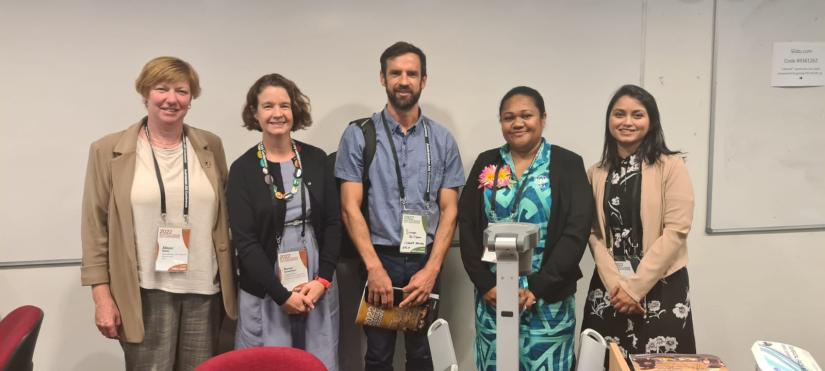The development sector faces a critical challenge in addressing climate change. Researchers at the 2022 Australasian Aid Conference explored new ways of integrating climate risk into development programs.

Addressing climate change is a critical issue for the development sector given its links with poverty, injustice and inequality. Climate change amplifies and intersects with other risk factors and threatens to undermine or even reverse development gains.
Efforts to integrate climate risk into development programs are needed to ensure continued progress against the backdrop of increasing climate change impacts. System transformation of the development sector is critically needed to ensure development progress continues against the ever-increasing risk of climate change impacts.
A revival of interest in climate change is occurring. Renewed climate action commitments globally and by the Australian Government calls for a coordinated response. However, more efforts are needed to define strategies, build knowledge and awareness for an effective integrated approach to managing climate risk in our region.
Researchers from the UTS Institute for Sustainable Futures (ISF) hosted a panel session back at the 2022 Australasian Aid Conference to explore new ways of integrating climate risk into development programs.
The session was chaired by Dr Keren Winterford from ISF. Four panellists joined the session which included Ms Christine Lemau, Program Director, ADRA Fiji; Mr Simon Wilson, Climate Change Specialist, Australia Pacific Climate Partnership; Dr Alison Baker, Fund Manager, Water for Women and Dr Tazrina Chowdhury, Research Consultant, ISF.

[l-r]: Dr Alison Baker, Dr Keren Winterford, Mr Simon Wilson, Ms Christine Lemau, Dr Tazrina Chowdhury
There were several key takeaways from the session, with panellists providing their insights on how to integrate climate change more effectively into the development sector.
Simon noted, “Climate change calls for an integrated approach and requires vision, leadership, resources and technical support across different domains of development programming”.
Experts have emphasised the importance of a holistic approach to climate integration, noting that climate action should be seen as part of the broader system of development practices. The practice of climate change integration needs to expand to include approaches that consider root causes of vulnerability or barriers to resilient development, and the role of governance – including civil society organisations (CSOs) and communities
Another key enabler of good practice integration is taking an intentional approach, with a deep understanding of how taking an integration approach will create pathways towards positive change and create meaningful and practical development impacts. Donors, implementing partners, and all stakeholders need to have a clear and uniform understanding of the intention and expected outcome from certain approaches to climate integration.
Experts also highlighted the importance of supporting local leadership to champion climate integration, with community-led research approaches ensuring that climate integration efforts are beneficial and offer tangible outcomes to the community. However, local CSO partners often face challenges in implementing climate integration projects due to technical language barriers. Thus, donors should review local CSOs' requirements to reduce barriers to accessing climate finance.
Climate change calls for an integrated approach and requires vision, leadership, resources and technical support across different domains of development programming.
– Simon Wilson, Australia Pacific Climate Partnership
Collaboration and being humble in partnerships can facilitate effective climate integration, with true partnerships and ongoing engagement between different stakeholders creating new ways of learning among partners and facilitating reflective processes that ensure ongoing learning is integrated into their approaches.
Grounding climate integration approaches in local systems and acknowledging existing knowledge is another key takeaway. Local knowledge should not be considered as ‘add-ons’ but prioritised as a similarly important and legitimate knowledge base.
These insights are vital in moving forward and integrating climate risk into development programs.

